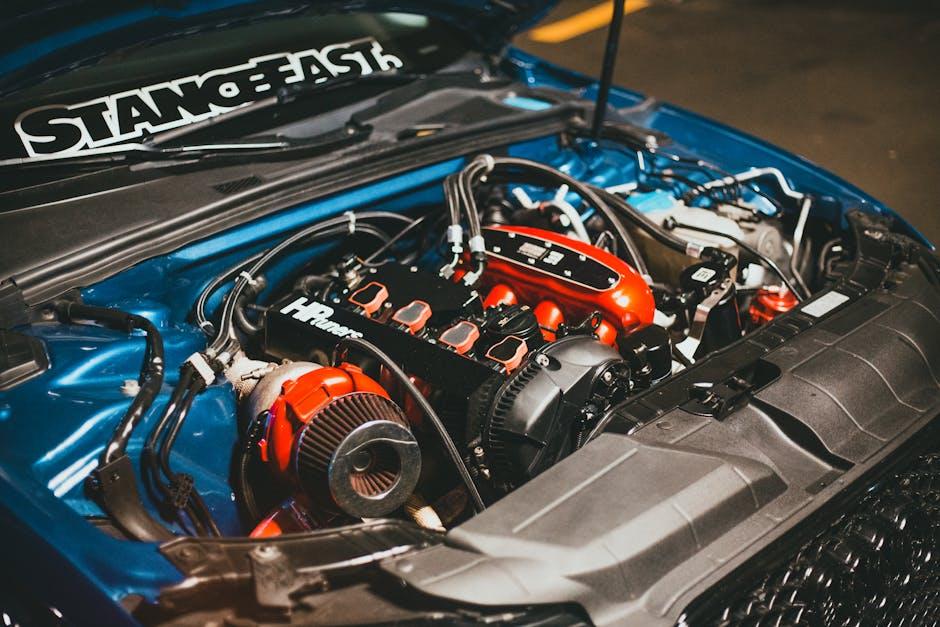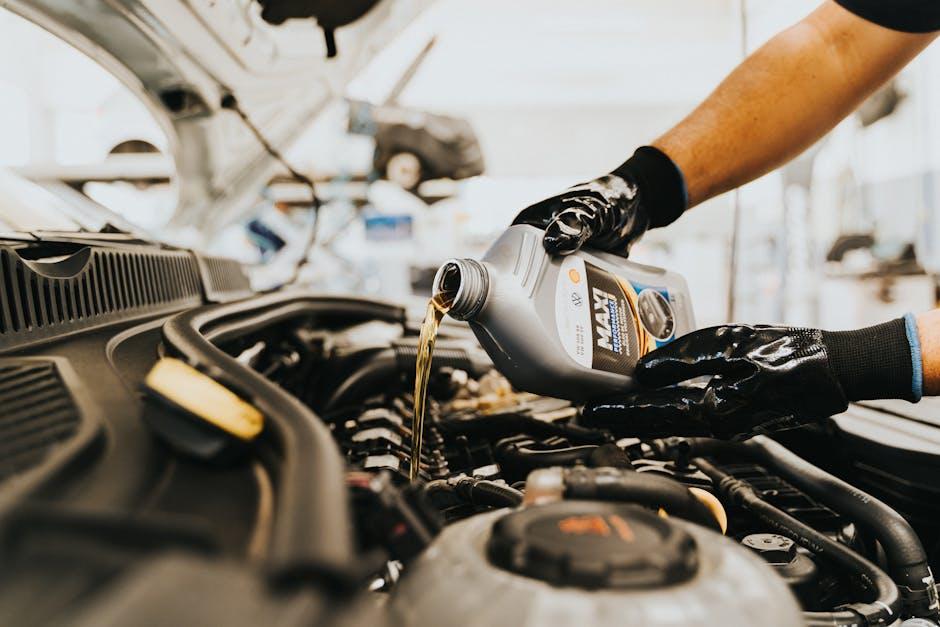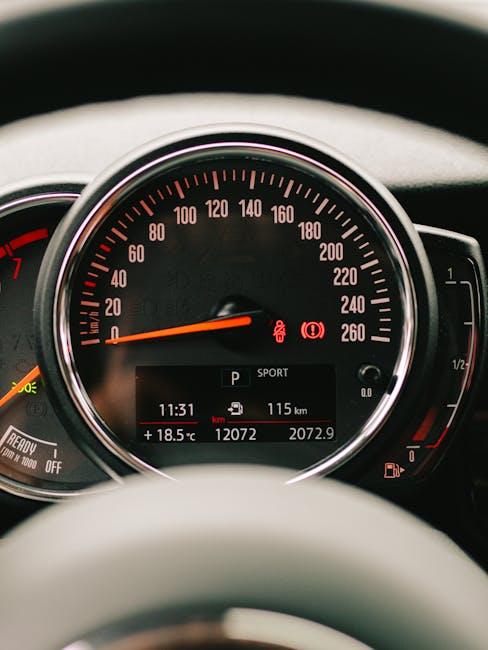Beneath the hood of your vehicle lies a complex symphony of parts working in harmony to keep you moving smoothly. But like any finely tuned instrument, your engine can signal when something is amiss—often in subtle ways before turning into costly problems. Recognizing these early warnings can mean the difference between a quick fix and a roadside emergency. In this article, we explore the unmistakable signs your engine needs immediate attention, helping you safeguard your ride and ensure every journey stays on track.
Table of Contents
- Common Warning Noises That Should Never Be Ignored
- Unexplained Drops in Engine Performance and Efficiency
- The Importance of Monitoring Fluid Levels and Quality
- Recognizing the Smell of Trouble: Burnt Oil and Coolant Alerts
- Dashboard Indicators That Signal Urgent Engine Issues
- Steps to Take When Your Engine Shows Signs of Distress
- Q&A
- The Way Forward

Common Warning Noises That Should Never Be Ignored
Engines often communicate their distress through distinct acoustic signals, which, if neglected, can escalate into costly repairs or complete breakdowns. Among these, a persistent knocking or pinging sound signals improper combustion and can damage engine components if left untreated. Similarly, a rhythmic tapping noise under the hood might indicate low oil pressure or a problem with the lifters, requiring immediate diagnosis. Ignoring these auditory clues can lead to irreversible engine damage, so early detection and prompt action are critical.
Other sounds demand just as much attention. A squealing noise often points to a worn serpentine belt or a failing pulley, both essential for the operation of your engine’s accessories. Meanwhile, a harsh grinding sound may be a red flag for bearing issues or failing gears within the engine’s internal mechanisms. The table below lists some frequent warning noises and their possible causes, serving as a quick reference to help you discern engine distress signals:
| Noise | Possible Cause | Urgency Level |
|---|---|---|
| Knocking/Pinging | Detonation/Misfire | High |
| Tapping | Low oil pressure/Lifter issue | Medium |
| Squealing | Worn belts or pulleys | Medium |
| Grinding | Engine bearing failure | High |
| Hissing | Overheating or coolant leak | High |

Unexplained Drops in Engine Performance and Efficiency
When your engine suddenly starts to feel sluggish or less responsive, it’s a clear sign that something beneath the hood isn’t functioning as it should. Often, these unexpected declines in power come without an obvious cause, leaving drivers puzzled. Pay close attention if your vehicle exhibits any of the following symptoms, which could signal deeper mechanical issues:
- Reduced acceleration despite pressing the pedal firmly
- Poor fuel economy without a change in driving habits
- Unusual engine noises during normal operation
- Check engine light illuminating unexpectedly
Understanding the potential culprits requires a glance at common factors contributing to efficiency drops. Components like clogged fuel injectors, worn spark plugs, or failing sensors can disrupt optimal engine function. The table below summarizes some typical causes and their possible effects:
| Cause | Effect on Performance | Common Sign |
|---|---|---|
| Dirty Air Filter | Reduced airflow, decreased power | Black smoke from exhaust |
| Faulty Oxygen Sensor | Poor fuel mixture, lower mileage | Check engine light |
| Worn Spark Plugs | Misfires, sluggish acceleration | Rough idling |

The Importance of Monitoring Fluid Levels and Quality
Engine fluids are the lifeblood of your vehicle, silently working to keep every component running smoothly. When fluid levels drop or their quality deteriorates, your engine starts to strain and signals distress. Ignoring these subtle warnings can quickly escalate into costly repairs. Regularly checking and maintaining fluids such as engine oil, coolant, brake fluid, and transmission fluid ensures your engine operates within the optimal temperature range, maintains lubrication, and prevents corrosion.
Key indicators to watch for include:
- Unusual oil color or texture, signaling contamination or depletion
- Frequent overheating caused by reduced coolant efficiency
- Delayed response in braking or shifting gears linked to fluid degradation
- Leak spots under the vehicle that often hint at failing seals or hoses
Understanding the importance of fluid care greatly extends your engine’s lifespan and performance. Below is a quick reference table highlighting the recommended check intervals and typical signs of fluid issues:
| Fluid Type | Check Frequency | Common Warning Signs |
|---|---|---|
| Engine Oil | Every 3,000-5,000 miles | Dark, gritty oil; oil level drop |
| Coolant | Every 30,000 miles or 2 years | Rust-colored or low coolant; overheating |
| Brake Fluid | Every 2 years | Spongy brakes; fluid darkening |
| Transmission Fluid | Every 30,000-60,000 miles | Burnt smell; rough shifting |

Recognizing the Smell of Trouble: Burnt Oil and Coolant Alerts
There’s a distinct aroma that you should never ignore when it wafts from under your hood. The sharp, acrid scent of burnt oil signals that something inside your engine is overheating or leaking, potentially causing serious damage if left unchecked. This smell often accompanies smoke or slight oil residue around engine components, which can mean seals, gaskets, or other vital parts are failing. Catching this early can prevent costly repairs and keep your engine running smoothly.
Coolant leaks also bring a warning signal, identifiable by a sweet, syrup-like smell that tends to linger even after the engine cools down. This indicates a possible radiator or hose compromise, which risks engine overheating and can quickly escalate to engine failure. Watch out for related symptoms such as:
- A sudden drop in coolant levels
- Visible coolant puddles beneath the car
- Rising engine temperature gauges
| Smell | Possible Cause | Immediate Action |
|---|---|---|
| Burnt Oil | Leaking gasket or seal | Inspect and replace faulty parts |
| Sweet Coolant | Radiator hose leak or crack | Check coolant levels and repair leaks |

Dashboard Indicators That Signal Urgent Engine Issues
When your vehicle’s engine is in distress, the dashboard often becomes the first line of defense, flashing warnings that demand immediate attention. These indicators are not just lights; they are vital signs of your engine’s health. The Check Engine Light is the most notorious signal, illuminating when the onboard diagnostics detect irregularities ranging from minor sensor faults to severe engine malfunctions. Similarly, the Oil Pressure Warning light warns of dangerously low oil levels or circulation issues, risking severe engine damage if ignored. Another critical alert is the Temperature Warning light, signaling overheating that can quickly lead to engine failure if cooling system malfunctions go unaddressed.
To keep these dashboard indicators clear and your engine healthy, it’s useful to recognize what each warning specifically implies. Below is a quick reference table summarizing these major signs:
| Indicator | What it Means | Recommended Action |
|---|---|---|
| Check Engine Light | Engine or emissions system fault detected | Get a diagnostic scan; avoid heavy engine load |
| Oil Pressure Warning | Low oil pressure or circulation failure | Stop driving; check oil level immediately |
| Temperature Warning | Engine overheating | Turn off engine; check coolant levels and radiator |

Steps to Take When Your Engine Shows Signs of Distress
When your engine begins to exhibit symptoms of distress, prompt action is crucial to avoid costly repairs or breakdowns. Start by immediately pulling over safely and turning off the engine to prevent further damage. Next, check under the hood for obvious signs such as leaking fluids, loose or broken belts, or excessive steam. If you notice any unusual noises or odors, make a note of them, as these details will be invaluable when consulting a professional mechanic.
Before calling for assistance, gather key information that can help expedite the diagnosis: the current odometer reading, how long the symptoms have been present, and any recent changes in performance or maintenance history. While waiting for a tow or roadside help, avoid attempting any complicated fixes unless you have mechanical expertise. Here’s a quick checklist for your reference:
- Turn off the engine immediately to prevent damage.
- Inspect visually for leaks or broken components.
- Note all unusual sounds or smells.
- Record recent maintenance and symptoms.
- Contact a trusted mechanic or roadside assistance.
| Symptom | Immediate Action |
|---|---|
| Overheating | Stop engine, check coolant |
| Knocking noise | Avoid acceleration, call mechanic |
| Warning lights | Note light type, seek diagnostics |
| Fluid leaks | Identify fluid, avoid driving |
Q&A
Q&A: Signs Your Engine Needs Immediate Attention
Q1: How can I tell if my engine is in trouble before it completely breaks down?
A1: Your engine often gives warning signs before a major failure. Listen for unusual noises like knocking or ticking, watch for warning lights on your dashboard, and be alert to changes in performance such as sluggish acceleration or rough idling. Early detection can save you from costly repairs.
Q2: What does it mean when I see smoke coming from under the hood?
A2: Smoke from the engine bay is a red flag. White smoke might indicate a coolant leak or a blown head gasket, while blue smoke often signals burning oil. Black smoke usually means your engine is running too rich. Any smoke is a reason to stop driving and get professional help immediately.
Q3: My “Check Engine” light just came on. Should I panic?
A3: Don’t panic, but don’t ignore it either. The “Check Engine” light can signal anything from a loose gas cap to serious engine trouble. Use an OBD-II scanner to read the error codes, or have a mechanic diagnose the issue as soon as possible to prevent further damage.
Q4: What are the dangers of ignoring strange engine noises?
A4: Strange noises like knocking, grinding, or squealing can indicate issues with internal components or accessories like the timing belt or alternator. Ignoring these sounds can lead to catastrophic engine failure, leaving you stranded or facing expensive repairs.
Q5: Why is overheating a sign of engine distress?
A5: An engine running too hot is under extreme stress and can suffer permanent damage like a warped cylinder head or a cracked engine block. Overheating often points to problems with the cooling system, such as a coolant leak, a faulty thermostat, or a broken radiator fan. Immediate attention is critical.
Q6: If my engine is leaking fluids, how urgent is the situation?
A6: Fluid leaks are serious because they can lead to low oil pressure, overheating, or hydraulic failure. Oil spots, coolant puddles, or fuel leaks require immediate inspection to prevent engine seizure or fire hazards.
Q7: How important is engine performance in diagnosing trouble?
A7: Sudden drops in power, misfires, stalling, or rough idling suggest that your engine is struggling. These symptoms often mean that the combustion process is compromised or that sensors are malfunctioning, both of which call for prompt mechanical evaluation.
Q8: Can ignoring maintenance accelerate engine problems?
A8: Absolutely. Skipping oil changes, delaying tune-ups, or neglecting fluid checks allow wear and tear to build up. Over time, this neglect dramatically increases the likelihood of sudden engine breakdowns needing immediate repairs.
Q9: When should I contact a professional versus trying to fix the engine myself?
A9: If you notice any of the warning signs mentioned—strange noises, smoke, warning lights, leaks, or overheating—it’s safest to seek professional help. Attempting DIY fixes without experience can sometimes worsen problems or create safety risks.
Q10: What steps can I take right now if I suspect my engine needs attention?
A10: First, safely pull over and turn off the engine to prevent further damage. Check fluid levels if you can do so safely, and look for obvious leaks or damage. Contact a qualified mechanic to get a thorough diagnostic and avoid driving until the problem is resolved.
By recognizing these vital signs early, you keep your engine healthy and your journey safe. Your car’s subtle signals are your first line of defense—listen carefully!
The Way Forward
In the intricate dance under your hood, your engine speaks volumes—if you know how to listen. Ignoring the subtle whispers and glaring warnings alike can swiftly turn a minor hiccup into a costly ordeal. By staying attuned to the signs your engine needs immediate attention, you not only safeguard your vehicle’s performance but also ensure your journeys remain smooth and safe. Remember, proactive care today paves the road for worry-free miles tomorrow. Keep an eye, an ear, and a keen sense—your engine will thank you.


2 Comments
uwczrh
uwczrh